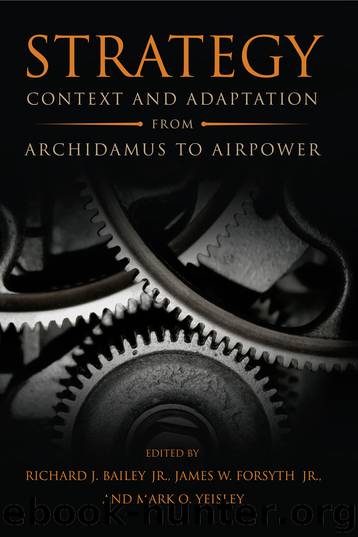Strategy by Richard Bailey

Author:Richard Bailey
Language: eng
Format: epub
ISBN: 9781682470176
Publisher: Naval Institute Press
Published: 2016-03-15T16:00:00+00:00
CHAPTER EIGHT
Spacepower and the Strategist
M. V. SMITH
In theory there is no difference between theory and practice. In practice, there is.
—Attributed to Yogi Berra
Yogi Berra, the famous Yankee catcher and later manager, probably never read Clausewitz’s immortal treatise On War.1 Yet the epigraph above sums up one of the more complex concepts that Clausewitz wrestles with over several pages: Why is there a difference between planning and execution, or between book learning and experience? Why is it that on paper “everything in war is very simple, but the simplest thing is difficult?”2 The great Prussian master cited “friction” as the cause. He explained it this way: “Countless minor incidents—the kind you can never really foresee—combine to lower the general level of performance, so that one always falls short of the intended goal . . . that more or less corresponds to the factors that distinguish real war from war on paper.”3 More succinctly, the Hall of Famer quoted above elsewhere explained the phenomenon as only he could: “If the world were perfect, it wouldn’t be.”
Presenting the wisdom of a war theorist and a baseball manager side by side might seem to be comparing apples and oranges, but it is not. Both men were strategists in their own fields, and as Professor Colin Gray points out, “There is an essential unity to all strategic experience in all periods of history because nothing vital to the nature and function of [competition] and strategy changes.”4 While Berra and Clausewitz had their own specialties and grammars, they shared the same logic as they went about devising their strategies, which Everett Dolman defines as the crafting of “a plan for attaining continuous advantage” over an opponent.5
A strategist from any discipline can take some relief in being on the same “strategic playground” regarding spacepower as any other competitive endeavor. As Professor Gray points out, “[Competition] has a grammar, but not a policy logic, of its own. [Competition] in space has its own distinctive [context] that policy must know and respect, but such [competition] has meaning only for the purpose of policy.”6 This means that a person versed in general strategic theory has many skills transferable to the art of crafting and assessing strategies, including for spacepower.
There is a difference between theory and practice, as the previous discussion points out. Theory teaches the rules, whereas experience teaches the exceptions. The exceptions are rooted in the unique context of the environment. It is as simple as the differences among land, sea, air, space, and cyber.7 This chapter is about the context of spacepower and its employment for strategic effect, which is defined here as doing something in space in the pursuit of the aims of policy. If the policy is properly harmonized with strategy, spacepower will be employed in a manner that seeks continuous advantage in the never-ending competition with other actors. What constitutes an advantage varies. Its pursuit may require space activities for a negative aim of preserving a status quo or for a positive aim of establishing a new order of things.
Download
This site does not store any files on its server. We only index and link to content provided by other sites. Please contact the content providers to delete copyright contents if any and email us, we'll remove relevant links or contents immediately.
| Africa | Americas |
| Arctic & Antarctica | Asia |
| Australia & Oceania | Europe |
| Middle East | Russia |
| United States | World |
| Ancient Civilizations | Military |
| Historical Study & Educational Resources |
The Radium Girls by Kate Moore(12022)
100 Deadly Skills by Clint Emerson(4922)
Rise and Kill First by Ronen Bergman(4784)
The Templars by Dan Jones(4686)
The Doomsday Machine by Daniel Ellsberg(4489)
The Rape of Nanking by Iris Chang(4209)
Killing England by Bill O'Reilly(4000)
Stalin by Stephen Kotkin(3963)
Hitler in Los Angeles by Steven J. Ross(3944)
12 Strong by Doug Stanton(3545)
Hitler's Monsters by Eric Kurlander(3335)
Blood and Sand by Alex Von Tunzelmann(3201)
The Code Book by Simon Singh(3187)
Darkest Hour by Anthony McCarten(3125)
The Art of War Visualized by Jessica Hagy(3006)
Hitler's Flying Saucers: A Guide to German Flying Discs of the Second World War by Stevens Henry(2754)
Babylon's Ark by Lawrence Anthony(2676)
The Second World Wars by Victor Davis Hanson(2524)
Tobruk by Peter Fitzsimons(2514)
